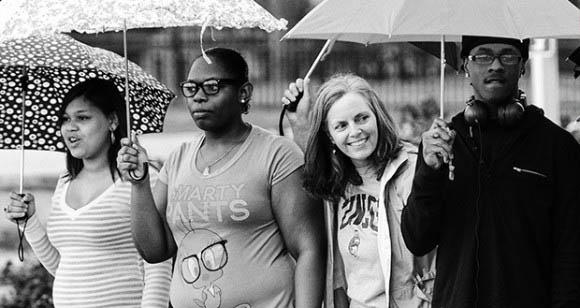The small but determined group gathered in front of the Bryan YMCA took hold of the bright green metal structure and hoisted it onto concrete footings nearby.
Traffic along Market Street downtown slowed as drivers strained for a glimpse. State and federal workers on lunch break stopped to inquire.
“This is everything I’d hoped for,” artist Julia Burr pronounced. “Almost exactly how I envisioned it.”
Bold. Unique. Distinctive.
Greensboro’s newest work of public art — a bus shelter to protect the city’s public transit riders from harsh weather — is all that.
And so much more.
To understand why, you have to rewind to 2007. That’s when the partnership between UNCG and Dudley High School began to take root. When students from Dr. Spoma Jovanovic’s communications studies classes started visiting the poor, predominantly black high school in east Greensboro.
The idea was to involve the high-schoolers in a conversation about civic engagement and social change. It began, quite simply, by reading the newspaper together, learning what was going on in their community and understanding that they could be a part of it.
“We know the more people understand about a community, the more they are connected to it and involved in it,” Jovanovic explained. “At Dudley, we were seeing students who were dropping out. We thought, if we can show students how they can make an impact in their communities, then perhaps they will see a reason to stay in school — they will see that they do matter.”
So together, the students learned how to become engaged citizens. They settled on an issue they cared about — the lack of bus benches and shelters throughout the city to protect transit riders from the elements — and went to work trying to change it. They dubbed the project “BUBBS: Bringing Us Bus Benches and Shelters.”
They created a video, a rap, a Facebook page, a blog and posters highlighting the cause. They circulated a petition and organized a march. They wrote letters to the local newspaper. They made presentations to civic groups and government agencies.
And Dudley and UNCG students raised enough money to finance their first bus bench at Pear and English streets, not far from Dudley High. Two more benches followed.
Their big break came in 2011, when the students entered — and won — SynergG’s “Big Idea” competition, netting $10,000 for their bus shelter project.
For Dante Johnson, a graduate student at UNCG who received his master’s degree in communication studies in 2011, BUBBS changed the course of his life. Johnson had planned to pursue a PhD and become a college professor. Instead, he joined Teach For America and now works as an elementary school teacher.
“Working with minorities, with economically disadvantaged kids, my mindset changed,” he explained. “I decided I need to make sure that students like that get to college.”
As director of the university’s Office of Leadership and Service-Learning, Cathy Hamilton’s job is to facilitate this kind of engagement.
“We want our students to be successful, especially now with this push for job readiness and economic development,” she said. “But I am saying let’s go beyond a successful student to a student who knows what he is doing is significant.”
Crystal Edwards Oldham, who earned a master’s degree in communication studies in 2012 and also worked with BUBBS, believes UNCG does that much better than most.
“UNCG recognizes that academia should not just be this ivory tower place and we are disconnected from the community. UNCG recognizes that it can be a force, a positive force, in Greensboro and in the state,” Oldham said. “I don’t know if a lot of universities and colleges do that, or do that as well as UNCG.”
Few provide these experiences with the level of passion and expertise that Jovanovic brings to the job. She’s not one to take credit, but anyone involved in UNCG’s unique partnership with Dudley will tell you the heart that keeps it beating belongs to her. Students come and go. Jovanovic is the constant.
“Dr. Jovanovic’s teaching and service are inseparable,” Hamilton said. “She believes that education plays a critical part in transforming the world, that the purpose of education is to help students recognize that their learning is directly connected to solving complex social problems. I believe that it takes special talent to empower students in this way.
“She’s got it.”
Story by Betsi Robinson, University Relations
Photography by Christopher English, University Relations
UNCG Now story posted by Betsi Robinson ( msrobin2@uncg.edu )
Reposted from UNCG’s DSBA Features
